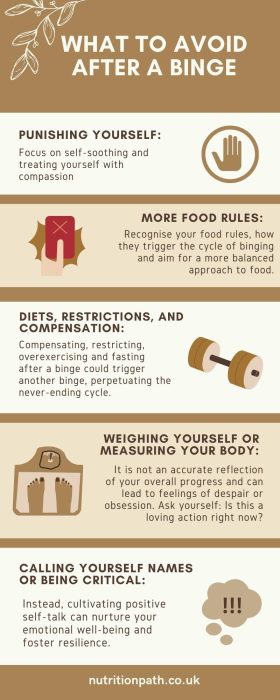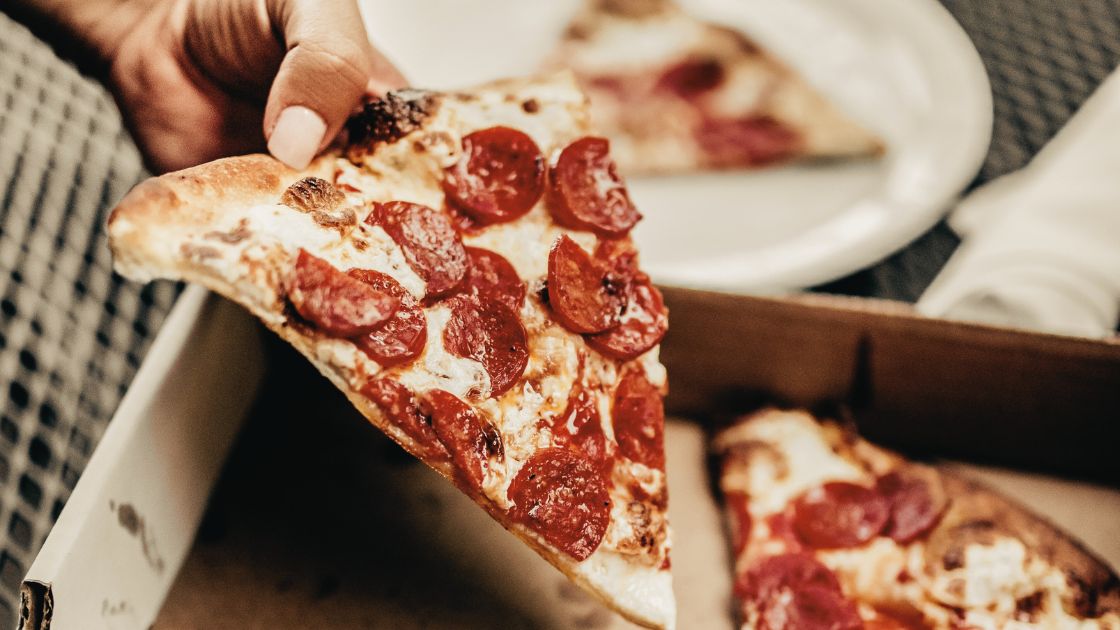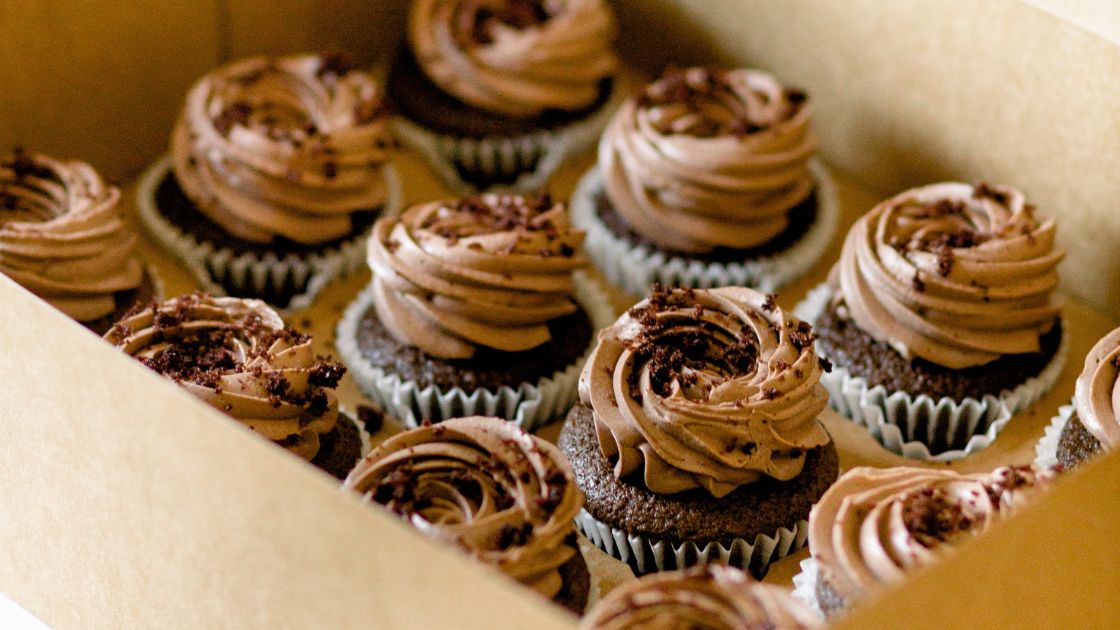Oh no, you binged, it happened again! You find yourself in a binge, filled with regret and guilt after eating and you just don’t know what to do next.
It all started with spilling your morning coffee on important work documents, running late to all your meetings and getting into a row with your mum. One thing after another and it seems like your day is completely snowballing and there’s no turning back.
Initially driven by stress and overwhelm you suddenly come out of a trance-like binge. You realise what has happened and you start feeling the guilt after eating. Negative emotions start to completely take over. Now what?
It’s important what you do in the next hour, a few hours and even a day after a binge eating episode. It’s key to include as many nurturing activities as possible, even if it feels counter-intuitive. Recovery time after a binge could define how the next few days look like for you. Make sure you do all you can to restore balance.
In this blog post, I’ll share some do’s and don’ts to get back on track after binge eating. This will also help get back into emotional and physical balance.
How to stop feeling the guilt after eating
A binge episode is often riddled with enormous guilt about the amount of food eaten, the calories and gaining weight. And the old dieting messages and food labels such as “good food”, “bad food”, “naughty” and “calorific”, make matters worse.
Sometimes it may be easier said than done, however, focus on the next steps and move on from the event.
Recognise that food rules and skewed messages about food may contribute towards anxiety around food and binges in the first place. Instead, aim to develop a more balanced view of food. Avoid strict rules and all-or-nothing thinking around food. Because it will only create more anxiety and guilt, even when eating one biscuit or slice of chocolate.
The guilt after eating often spirals into self-loathing, creating a negative cycle of guilty feelings and food shame. The eating-related guilt can lead to restriction, extreme hunger and potentially lead to further binges. Attempt to let go of this guilt by accepting the episode as a bump in your journey towards healthy eating habits.
Reframe this event as a learning opportunity. Forgive yourself (I know, this can be hard!). Move on by shifting your focus to more nurturing activities that help you cultivate a sense of well-being. Reassure yourself that it's okay to have a setback as long as you continue making progress.
Should you be fasting after a binge?
The idea of fasting after a binge might be tempting as it may feel like a way to “undo” the damage done. You may even be tempted to experiment with a super restrictive diet or intermittent fasting to regain control around food. While the urge to restrict may be strong, the motivation for fasting is not coming from the right place.
After a binge episode, it is really important to give the body balance and regularity. Fasting after a binge may create an unnecessarily long gap and fuel further blood sugar dysregulation. That can lead to food cravings or an increased desire for sugary foods, rather than nutrient-dense foods.
One study of 1234 participants found that 50% of people, who identify as stress-eaters ate more. However, the other 50% of people ate less food than needed, which can absolutely contribute towards the binge cycle.
If you're familiar with the binge-restrict cycle, you may be in the stage of "shame and guilt after eating" post-binge. It could be a breaking point of either continuing the endless binge-restrict cycle or ending the cycle there and then.
Moreover, identifying where you get stuck in the cycle over and over again. It can also help put an end to disordered eating and help you cultivate a healthy relationship with food and finally reach food freedom.
Here are the stages of the binge-restrict cycle:

What to do after a binge:
What to do after a binge? Should I be fasting after a binge? Should I restrict my food intake?
Your next steps are crucial in helping you get back on track with physical balance, nourishment and restoring your mental health. And this may just be enough to stop the cycle of bingeing the next day or for days to come.
Here are some helpful tips on what to do after a binge to get back on track with your health goals and some helpful tips on what to avoid!
Eat the next meal
If you’ve overeaten or had too much, the last thing you want to think about is your next meal. It’s very common to revert to food restriction after a binge (scroll up for the binge-restrict cycle image).
If you binged in the evening, skipping dinner may feel tempting. Or even skipping breakfast the next day, to compensate for the calories and food that you’ve consumed.
Although it may sound counter-intuitive, it is very important to have the next meal. As it sends a message to your body that food is regularly available. This will help you get out of the cycle of fasting and feasting, which only creates more urges to binge.
Aim to have nutritious food for your next meal, even if it's a smaller portion than usual. Practice mindful eating as much as it can help you reduce the bloated feeling. It can also help the feelings of hunger come back sooner and prevent another food binge immediately.
Avoid the temptation to punish yourself with compensation, restriction or fasting after a binge. Instead, lead with compassion and nourish your body.
Add lean proteins, complex carbs and beneficial fats to your next meal. Most importantly, make sure you have a proper breakfast the next day with a complete source of protein. Eggs on rye toast with avocado or scrambled egg with veg and sweet potato are some wholesome food choices to try.
Stay hydrated
Drinking plenty of water, as well as eating your next meal should be the two top actions on the list of what to do after a binge from the physical side. Don’t underestimate the power of sufficient water intake. It can help you detoxify, process food better and help rid the body of unnecessary bloating.
Avoid drinking instantly after a binge as it will make you feel overly full and uncomfortable. Instead, wait an hour or so and drink a glass of water or two, or a couple of big mugs of herbal tea. Peppermint, ginger and fennel teas are a great support for digestion and can also help reduce bloating.

Move gently
Gentle movement can be another great distraction and a way to self-soothe. Make sure you are not using exercise and movement to punish yourself for the calories eaten. But rather that it's helping the body gain extra energy and promoting overall well-being.
You might be on a weight loss journey or just simply trying to get back to a healthy lifestyle. Whatever your goals, the day of binge eating is NOT the time to push yourself with intense exercise.
Perhaps you're also experiencing water retention, which is perpetuating the cycle of binge eating and food restriction. Keep in mind that it is temporary and it's just your body trying to cope with the quantity of food. Gentle exercise can certainly be helpful, but it's important to stay mindful.
Choose light exercise and gentle stretching, yin or restorative yoga classes. Opt-in for walks in nature, gentle cycling and swimming over HIIT training and spinning-class type of activities. A boost of endorphins is helpful to support mental health if your moods tend to get low after a binge.
Learn to self-soothe
Self-soothing is an analogy of a friend hugging you and telling you it will all be okay. Except that you are that friend for yourself. Self-soothing can include many actions and thoughts and it will be unique to each person. However, it’s important to bring compassion into the picture.
Use some of the 5 senses to self-soothe and think of your favourite ways to indulge in these senses (except food!). Perhaps go to your favourite picturesque nature spot where you feel inspired or a gallery if you love art. Maybe get out the essential oils in a diffuser or light-scented candles. Or maybe having a nice bath with bath salts and foam or listening to some relaxing music.
At first, you may not be convinced that it will work, but give it a try before dismissing it. If you find it hard to be kind and compassionate towards yourself, imagine that you are helping a friend get over a tough time instead.
Dress comfortably
In the spirit of self-care, make sure you wear something comfortable and cosy. If you are already feeling bloated and uncomfortable after a binge, the last thing you want is to get into tight or uncomfortable clothing. It may be a trigger for further restriction or binge-eating thoughts.
Avoid trying on your old “gauge” jeans or that dress that you weren’t able to get into the last few months. Even if your mind might be trying to sabotage you right now because of an intense fear of weight gain. Remember, that worrying about it will just make you feel worse. So get your favourite lounge clothing out and get cosy!

Analyse the binge
Give yourself a couple of days. Then it can be useful to revisit the triggers that may have led to it. Draw a line in the middle of the page and on one side write physical triggers. These include skipping breakfast, having a very small lunch or overall lack of nutritious meals.
On another side write all the emotional triggers. These could be looking on Instagram straight after waking up and having a heated argument with your partner.
When you start going through your triggers list that led to the binge, you may notice triggers going back a few days or even a week. It is important to tag the binge as a “learning event” in your mind and take stock of the triggers. That way you are prepared for next time and know what to do after a binge and how to avoid one altogether.
Are you experiencing the same emotional eating triggers all the time? Is there something that can be prevented? Any adjustments that you can make to avoid triggers?
What to AVOID after a binge
After a binge eating episode, it's crucial to focus on self-compassion and avoid destructive behaviours. Here's what you want to steer clear of:
- Punishing Yourself: Overcoming binge eating is real if it's coming from the place of punishment. Although it may feel counter-intuitive after a binge, focus on self-soothing and treating yourself with compassion.
- More Food Rules: Implementing additional food rules after a binge can lead to a vicious cycle of restriction and binges, once again. However, it is helpful to recognise your food rules. How do they trigger the cycle of binging? Aim for a more balanced approach to food.
- Diets, Restrictions, and Compensation: Trying to compensate for a binge by drastically reducing your calorie intake, overexercising, or fasting after a binge could trigger another binge, perpetuating the never-ending cycle. The key is to return to regular eating patterns and balanced meals to balance blood sugar levels.
- Weighing Yourself or Measuring Your Body: Avoid the temptation to weigh or measure yourself immediately after a binge. It's not an accurate reflection of your overall progress and can lead to feelings of despair or obsession. Ask yourself: Is this a loving action right now?
- Calling Yourself Names or Being Critical: Negative self-talk and criticism won't help you recover from a binge. But will certainly make you feel even more crappy. Instead, cultivating positive self-talk can nurture your emotional well-being and foster resilience.
Remember, having a binge-eating episode is a normal part of overcoming binge eating. You are human and it's okay to have setbacks. The important thing is what to do after a binge to bounce back and learn from each binge episode, so you can move forward and progress.

When to seek help for binge eating
Whether you experience binges daily or once every few weeks, it is the thoughts, beliefs and intensity of guilt after eating that surround the binge episodes that are important. Are you in doubt about whether you should seek help or if it’s not necessary? Take stock of how much of your headspace thinking about food and your body is taking up, rather than the frequency of the behaviours.
If your relationship with food is making you miserable every single day, it’s a good enough reason to seek support with overcoming binge eating. Professional help can help you uncover underlying reasons why binge eating continues and how to stop it for good.
Working with a qualified professional can also provide you with the tools to make you physically and mentally. In turn, saying NO to urges becomes easy.
What to do after a Binge: Final Thoughts
t’s important to remember that no matter how many times you feel like you failed, you can pick yourself up with kindness and keep going. Striving for perfection when it comes to overcoming binge eating, won’t help create a balanced relationship with food in the long term – progress does!
Finally, it's important to remember that recovery from binge eating is a process. It doesn't happen overnight and it requires effort, patience and commitment. But with the right tools and support, it is possible to have a positive relationship with food that empowers you and makes you feel proud of yourself.
Keep going, I’m rooting for you! 🎉







